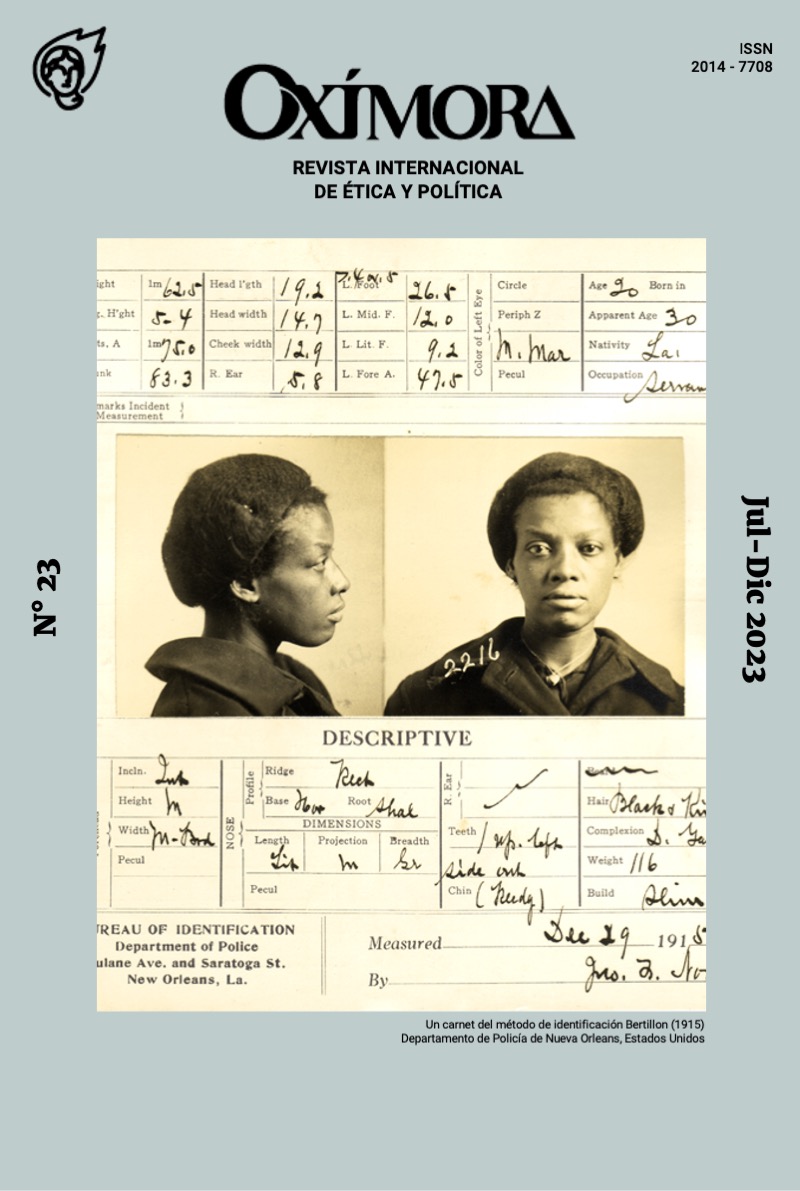Does denying an ethics of fundamentals imply sustaining an arbitrary ethics? Criticism of Zavadivker's characterization of Bunge's ethical theory
DOI:
https://doi.org/10.1344/oxmora.23.2023.42279Keywords:
Mario Bunge, ethic, metaethics, non-foundationist ethics, non-objectivist moral cognitivismAbstract
In his book An Ethics without Foundations, Nicolás Zavadivker argues that Mario Bunge’s ethical and metaethical theory pretends to base moral norms on factual premises, without making use of values. This paper disputes that thesis and argues that Bunge’s theory seeks to construct and evaluate a system of values and norms, rigorously and without arbitrariness, on the basis of factual knowledge and values of evaluators. Since Bunge’s theory includes values among its argumentative premises, it is incorrect to categorize it as a foundationalist position that dispenses with values.
References
Albert, H. (1968). Traktat über kritische Vernunft. Mohr, Tübingen.
Bagnoli, C. (Ed.). (2013). Constructivism in ethics. Cambridge University Press.
Bunge, M. (1960). Ética y ciencia. Buenos Aires: Siglo Veinte.
Bunge, M. (1977). Treatise on basic philosophy: Ontology I: the furniture of the world (Vol. 3). Dordrecht: Reidel.
Bunge, M. (1989). Treatise on Basic Philosophy: Ethics: The Good and The Right (Vol. 8). Dordrecht: Reidel.
Bunge, M. (1996). Ética, ciencia y técnica. Buenos Aires: Sudamericana.
Bunge, M. (1997). La Causalidad: el principio de causalidad en la ciencia mo-derna. Editorial Sudamericana.
Bunge, M. (2002). Ser, Saber, Hacer. Paidós Latinoamericana.
Bunge, M. (2005). Diccionario de Filosofía. Buenos Aires: Siglo XXI.
Bunge, M. (2010). Matter and mind: A philosophical inquiry. Springer Science & Business Media.
Bunge, M. (2012). Filosofía de la Tecnología y otros ensayos. Lima: Universi-dad Inca Garcilaso de la Vega.
Bunge, M. (2017). Elogio del cientificismo. Pamplona: Editorial Laetoli.
Copp, D. (2005). A skeptical challenge to moral non-naturalism and a defense of constructivist naturalism. Philosophical Studies 126(2), 269-283. doi: 10.1007/s11098-005-2161-4
Curry, O. S., Alfano, M., Brandt, M. J., & Pelican, C. (2021). Moral molecules: Morality as a combinatorial system. Review of Philosophy and Psychology, 1-20. doi: 10.1007/s13164-021-00540-x
De Ridder, J., Peels, R., & van Woudenberg, R. (Eds.). (2018). Scientism: Pro-spects and problems. Oxford University Press.
FitzPatrick, W. J. (2022). Ethical realism. Elements in Ethics. Cambridge Uni-versity Press.
Gill, M. B. (2008). Metaethical variability, incoherence, and error. En: Sinnott-Armstrong, W. (Ed.), Moral psychology: The cognitive science of morality 2 (pp. 387-401).
Gowans, Chris. (2021). Moral Relativism. The Stanford Encyclopedia of Philos-ophy.
Joyce, R. (2021). Moral Anti-Realism. The Stanford Encyclopedia of Philoso-phy.
Loeb, D. (2003). Gastronomic realism—A cautionary tale. Journal of Theoreti-cal and Philosophical Psychology, 23(1), 30. doi: 10.1037/h0091226
Loeb, D. (2008). Moral incoherentism: How to pull a metaphysical rabbit out of a semantic hat. Moral psychology: The cognitive science of morality: Intui-tion and diversity, 2, 355-85.
Romero, G. E. (2018). Scientific Philosophy. Berlin: Springer.
Rosen, G. (1994). Objectivity and modern idealism: What is the question? In Philosophy in mind (277-319). Springer, Dordrecht. doi: 10.1007/978-94-011-1008-2_17
Sayre-McCord, G. (2021). Moral Realism. The Stanford Encyclopedia of Philos-ophy.
Shafer-Landau, R. (2003). Moral Realism. A Defense. Oxford: Clarendon Press.
Teixidó, O. (2019). Sobre la axiología de Gustavo E. Romero y Mario Bunge. Scientia in Verba Magazine, 1. Versión más actualizada (2022) disponible en: 10.5281/zenodo.6582745
Teixidó, O. (2021). Necesidades, valores y normas desde una filosofía científi-ca. Universidad-Verdad, (78), 120-135. doi: 10.33324/uv.v1i1.396
van Roojen, M. (2018). Moral Cognitivism vs. Non-Cognitivism. The Stanford Encyclopedia of Philosophy.
Zavadivker, N. (2001). David Hume y la imposibilidad de pasar del ‘es’ al ‘de-be’. En: Maidana, S. (comp.), Los avatares de la modernidad, Facultad de la Filosofía y Letras, UNT, Tucumán.
Zavadivker, N. (2003). David Hume y los sentimientos morales. En: Maidana, S. (comp.), Los problemas de la filosofía. Una introducción a la razón mo-derna, Facultad de Filosofía y Letras, UNT, Tucumán.
Zavadivker, N. (2004). Una ética sin fundamentos. Tucumán: Universidad Nacional de Tucumán.
Zavadivker, N. (2005a). Acerca de la posibilidad de fundamentar las normas morales. Ideas & Derecho Nº 5, 143-172.
Zavadivker, N. (2005b). Negar una ética objetiva, ¿implica sostener que todo vale? En: Beatriz Guerci de Siufi (comp.), Filosofía en el NOA y más allá, Editorial de la Universidad Nacional de Jujuy, San Salvador de Jujuy.
Zavadivker, N. (2007). Justificar lo injustificable: la infructuosa búsqueda de los principios de la moral. En: Zavadivker, N. (comp.), La ética en la en-crucijada, Prometeo libros, Buenos Aires.
Zavadivker, N. (2008a). Alfred Ayer y la teoría emotivista de los enunciados morales. Anuario filosófico, 41(3), 661-685. doi: 10.15581/009.41.29223
Zavadivker, N. (2008b). La teoría emotivista de los valores de Bertrand Rus-sell. Revista de filosofía y teoría política, 39, 53-72.
Zavadivker, N. (2011). La ética y los límites de la argumentación moral. El desafío del emotivismo. Tucumán: Universidad Nacional de Tucumán, Fa-cultad de Filosofía y Letras.
Zavadivker, N. (2012). Neoracionalismo y metaética. Praxis Filosófica, 35, 83-96. doi: 10.25100/pfilosofica.v0i35.3478
Zavadivker, N. (2013). Acerca de las posibilidades y dificultades del naturalis-mo ético. Teorema, 32:2; 205-211.
Zavadivker, N. (2015). Emotivismo y argumentación moral. Revista Estudios de Epistemologia, 13, 78-95. http://hdl.handle.net/11336/12882
Zavadivker, N. (2015). Hume: sus aportes al análisis del lenguaje moral. Con-trastes. Revista Internacional de Filosofía 20(2), 269-279. doi: 10.24310/Contrastescontrastes.v20i2.2328
Zavadivker, N. (2016). Ética del abogado y modelos de ética normativa. En: Lariguet, G. (comp.), Metodología de la investigación jurídica, 54 contri-buciones actuales, Editorial Brujas, Córdoba.
Zavadivker, N. (2017). Interpretaciones metaéticas de la obra humeana. Cua-dernos de la Facultad de Humanidades y Ciencias Sociales. Universidad Nacional de Jujuy, 52, 27-35. http://hdl.handle.net/11336/83333
Zavadivker, N. (2019). Acerca de las relaciones entre el Derecho y la Moral. En: García Fernández, M. y Perera, J. G. H. (Eds.), Archivo Antología Ju-rídica del Bicentenario, Archivo Histórico de la Provincia de Tucumán.
Downloads
Published
How to Cite
Issue
Section
License
Copyright (c) 2023 Óscar Frederic Teixidó Durán, Primero, G.

This work is licensed under a Creative Commons Attribution 4.0 International License.
a) Authors retain copyright and grant the journal the right of first publication.
b) Texts will be published under a Creative Commons Attribution License that allows others to share the work, provided they include an acknowledgement of the work’s authorship, its initial publication in this journal and the terms of the license.



